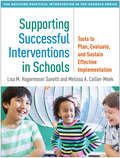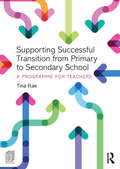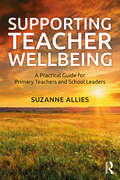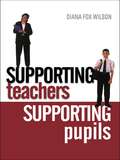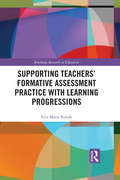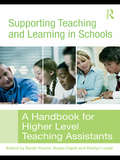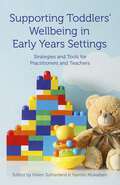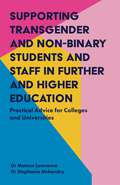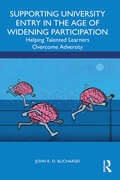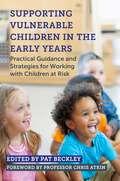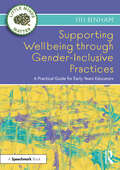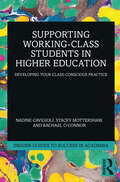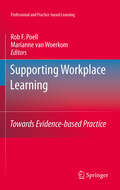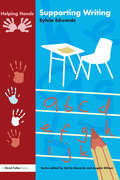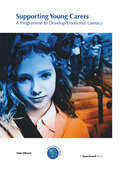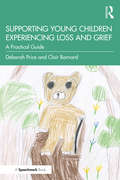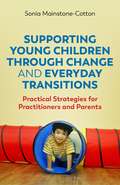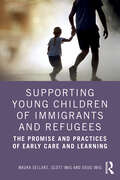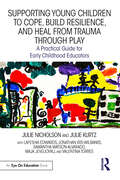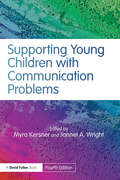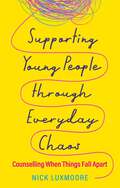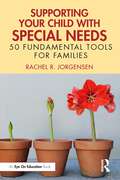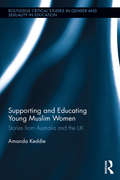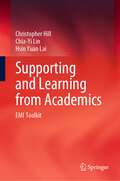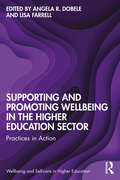- Table View
- List View
Supporting Successful Interventions in Schools: Tools to Plan, Evaluate, and Sustain Effective Implementation (The Guilford Practical Intervention in the Schools Series)
by Lisa M. Sanetti Melissa A. Collier-MeekEvidence-based interventions benefit learners only when they are implemented fully. Yet many educators struggle with successful implementation. This unique book gives practitioners a research-based framework for working with PreK–12 educators to support the effective delivery of academic, behavioral, and social–emotional interventions. Step-by-step procedures are presented for assessing existing implementation efforts and using a menu of support strategies to promote intervention fidelity. In a large-size format with lay-flat binding for easy photocopying, the book includes 28 reproducible worksheets, strategy guides, and fidelity assessment tools. Purchasers get access to a Web page where they can download and print the reproducible materials. This book is in The Guilford Practical Intervention in the Schools Series, edited by T. Chris Riley-Tillman.
Supporting Successful Transition from Primary to Secondary School: A programme for teachers
by Tina RaeThe transition from primary to secondary school is extremely important in the lives of children and young people but it is also a time of significant stress for many. This unique programme is designed to support children during this process, helping to build the confidence, skills and the resources that they will need in order to ensure a smooth and successful transition. This accessible text provides teachers, parents and professionals working with young people with a comprehensive range of resources to effectively support this process, and also: promotes the development of resilient children and young people who can cope effectively with the process of change encourage pupil participation and ensure that well-being is further fostered and maintained both for young people and staff within the learning context includes specific strategies, techniques and ideas regarding the transition process including systems and individualised approaches helps young people to visualise success, manage strong and complex emotions, cope with stress and anxiety, problem solve difficult situations, recognise their own signature strengths and build upon these through a series of activities and problem based learning opportunities. The programme itself also makes use of solution-focused approaches, motivational interviewing techniques, cognitive behaviour therapy strategies and a range of ideas and techniques taken from positive psychology and resilience theory. The wealth of resources offered here make this programme unique and engaging, and will be particularly useful to those who support children with SEN and higher levels of vulnerability.
Supporting Teacher Wellbeing: A Practical Guide for Primary Teachers and School Leaders
by Suzanne AlliesAll teachers are in the unique position of influencing the future happiness and success of the next generation; therefore it is crucial that the wellbeing of teachers is not overlooked. This proactive guide will empower school staff; it will enlighten and equip them with essential knowledge about wellbeing and remind them to never neglect their own health. It encourages a proactive approach to holistic wellbeing and deals with a serious topic in a humorous and lighthearted way. Structured as an easy-to-read guide, the chapters offer hands-on tips on how and why to support teacher wellbeing and advice on how to manage the increasing demands of planning, assessment and marking. What’s more, it emphasises the importance of sustaining a work-life balance, using mindfulness to relax and gain perspective, healthy eating, incorporating exercise into your schedule and maintaining a sense of calm in the classroom. This book: Includes personal stories that encompass the real experiences of early-career teachers, experienced teachers, senior leaders and trainee teachers. Delves into important topics such as stress, burnout, work-life balance, anxiety and controlling the mind. Highlights how to increase self-esteem, confidence and eradicate perfectionism at work. Suggests practical strategies related to workload reduction, peer support and a variety of self-care techniques. Written by a Primary Education lecturer with over 20 years of experience teaching in primary schools, this book is an essential resource for trainee teachers, early-career teachers, experienced teachers and school leaders alike.
Supporting Teachers Supporting Pupils: The Emotions of Teaching and Learning
by Diana Fox WilsonThis book draws from the real-life experiences and perceptions of teachers in secondary and primary schools, and documents their ideas on how they define their job, the difficulties they face in the classroom and the support they need. Different approaches to teacher support are considered and the book includes an in-depth case study of a school that tried to implement some of these approaches. Key issues covered include: the motivations and needs of teachers and pupils the gaps between theory and practice in the professional role and performance of the teacher the behaviour of pupils and their views on the classroom working with support staff the assertive discipline system. Drawing on her own experience and the experiences of others, Diana Fox Wilson recommends that teachers are supported by a classroom environment that fosters insight and understanding between pupils and teachers, and urges a culture of change that recognises teachers as a crucial influence on young people's lives. Supporting Teachers Supporting Pupils is packed with helpful and practical advice for all teachers. It will be a reassuring read for any teacher finding themselves feeling stranded in the classroom.
Supporting Teachers' Formative Assessment Practice with Learning Progressions (Routledge Research in Education #13)
by Erin FurtakThis book presents the results of a four-year, National Science Foundation-funded project that engaged nine high school biology teachers at three public high schools in long-term, on-site professional development program centered on a learning progression. It explores the influence of teacher participation in this professional development experience on their learning about student thinking, formative assessment task design, classroom practices, and student learning. Taking an in-depth look at the multiple sources of data gathered as part of the study, this volume reflects on the emergence of professional communities focused on formative assessment design and enactments and associations between teacher participation in learning progression-centered professional development and student learning.
Supporting Teaching and Learning in Schools: A Handbook for Higher Level Teaching Assistants
by Marilyn Leask Sarah Younie Susan CapelSupporting Teaching and Learning in Schools is an accessible, user-friendly handbook designed to provide practical guidance and ideas to support Higher Level Teaching Assistants (HLTAs). It covers the knowledge and skills needed by HLTAs to work effectively with pupils, teachers, parents and other professionals concerned with the well-being of children. The book relates directly to the standards for HLTAs but also provides a deeper grounding in pedagogy and the role of the teacher and the HLTA in creating productive learning environments. The text is illuminated with examples of existing good practice, and a range of tried-and-tested strategies to help HLTAs develop in all aspects of their work. It provides essential background knowledge, together with a range of activities designed to support learning, examining: the roles of the HLTA and teacher respectively, and interactively classroom management and interactions with pupils pupil differences the place of the HLTA within the school community professional development. The book can be used alongside the popular Routledge Learning to Teach in the Secondary School series, which gives detailed examples of theory and practice about teaching and learning for trainee teachers. It is an invaluable resource for current and prospective HLTAs working across a wide range of subjects
Supporting Toddlers’ Wellbeing in Early Years Settings: Strategies and Tools for Practitioners and Teachers
by Helen Sutherland Yasmin Mukadam Anne Rawlings Yngve Rosell Monika Röthle Cristina Corcoll Carme Flores Àngels GeisOffering an in-depth exploration of the distinctive features of the play development and learning of toddlers, this book provides useful materials, strategies and tools that can be used by practitioners supporting toddlers at this significant age. The book explores the context and concepts of wellbeing and is ideal for early years practitioners, teachers and students working with toddlers. It sets out practical guidance on the following key factors: home, family, health, development and learning, voice and expressions, early language, meal times and early years settings. These factors are supported with case studies and examples of good practice from Norway, Spain and the UK and expanded upon with reflective thinking exercises and suggested strategies to implement.
Supporting Transgender and Non-Binary Students and Staff in Further and Higher Education: Practical Advice for Colleges and Universities
by Matson Lawrence Stephanie MckendryAccording to the research underpinning this book, 85% of trans students and staff faced barriers. This practical guide enables post-secondary education professionals to create a safe and supportive environment for gender diverse applicants, students and staff. Using real life examples to explore common experiences and challenges for trans people in further and higher educational settings, it sets out policies, interventions and advice that have proven effective in providing impactful support on a wide range of issues such as learning, teaching, mental health, recruitment, support services, and institutional policies. Included is an easy-to-follow introduction to transgender terminology and identities, as well as legal and medical considerations.
Supporting University Entry in the Age of Widening Participation: Helping Talented Learners Overcome Adversity
by John R. BlicharskiDesigned for those working with widening participation students, this key guide provides all of the information needed to support learners from widening participation backgrounds and ensure fair admission to university can be effectively delivered. Providing the reader with a theoretical and practical understanding of how to reach non-traditional students, this book addresses the realities of the challenges the modern university widening participation applicant faces. Each chapter offers a fresh and engaging insight into widening participation and explores the fascinating range of factors that determine whether students from non-traditional backgrounds successfully access university and benefit from it. This book systematically considers the barriers, approaches and solutions required to reach university and encourages a ‘best evidence’ approach that could enable the people of tomorrow to have more equal access to learning and through that, a positive and healthy future on a planet under severe challenge. Ideal reading for all those working in widening participation or committed to expanding the diversity of their student populations, this book offers the insights, advice and considerations needed when deciding how best to help often highly vulnerable and unsupported students transform their lives through learning.
Supporting Vulnerable Children in the Early Years: Practical Guidance and Strategies for Working with Children at Risk
by Julie Percival Pat Beckley Yinka Olusoga Sarah Howe Professor Chris Atkin Antony Luby Nishi Bremner Julia Lindley-Baker Elizabeth Farrar Rosey Shelbourne Gina Taylor Helen Thornalley Beverley Keen Dr Margaret Simms Anne Renwick Emmy SealeyExploring specific experiences, circumstances and events that can put children at risk, this book provides practical guidance for early years practitioners working with vulnerable children. It covers supporting children who are abused and neglected, those with special educational needs, children from ethnic minorities, those with emotional or health difficulties, children affected by poverty and children in care.Each chapter draws on current research and theories to set out clear advice and strategies for supporting the wellbeing and development of vulnerable children, including working in partnership with parents, carers and communities.
Supporting Wellbeing through Gender-Inclusive Practices: A Practical Guide for Early Years Educators (Little Minds Matter)
by Fifi BenhamGender is a broad and complex concept, the impact of which can start even before a baby is born. It can be a source of restriction, but it is also a source of joy, and early years practitioners have a unique opportunity to empower new generations by creating gender inclusive environments where children feel confident and, above all, happy.This accessible and practical guide provides meaningful advice on how to improve and promote gender inclusion and wellbeing in early years settings. Chapters cover key areas, from gendered language and gender inclusive environments to trans and non-binary childhoods and encourage practitioners to reflect deeply on the way gender has impacted their own lives. The book provides: An overview and analysis of current guidance around gender equality and how this is integral to best practice. Real-world practical tips and strategies that can be introduced right away, including advice for working effectively with parents. Book recommendations for settings and consideration of the language used in fairy tales and nursery rhymes, as well as signposting to further learning for practitioners. Guidance on creating gender inclusive environments and making space for children to play around and make choices based on what brings them joy. Reflection points, practitioner reflections and case studies to bring theory to life. The early years presents the perfect time to encourage the exploration of identity as part of play, and the book enables practitioners to actively engage with this, to recognise and celebrate individuality, and to promote social, emotional, and mental wellbeing. This refreshing guide empowers practitioners to push boundaries in their setting to enable and maximise a positive approach to gender in practice. It is essential reading for all early years practitioners, as well as childminders and early childhood students.
Supporting Working-Class Students in Higher Education: Developing Your Class-Conscious Practice (Insider Guides to Success in Academia)
by Nadine Cavigioli Stacey Mottershaw Rachael O'ConnorPlacing a spotlight on the classism inherent in higher education, this book highlights the realities that working-class students face when navigating elite higher education spaces and the rewards and challenges of supporting these students in such spaces.Drawing on the life experiences of academics of working-class heritage and a Student Advisory Board, each chapter is positioned around a “myth” which is debunked with examples, practice, student perspectives, and research. Alongside this, the book serves as a support mechanism for practitioners to learn from working-class experiences in order to improve their own practice and be able to support their working-class students through the exploration of an intersectional, class-conscious pedagogy. It argues that classism should be a central item on the agenda of all those working in higher education if they are truly committed to making institutions spaces where all students feel they belong and have a voice.This ground-breaking book will support and enhance the practice of anyone with a role that engages with or impacts upon the lives and experiences of historically excluded students, whether directly through teaching, pastoral and administrative support, or indirectly through leadership, governance, and policy-making.‘Insider Guides to Success in Academia’ offers support and practical advice to doctoral students and early-career researchers. Covering the topics that really matter, but which often get overlooked, this indispensable series provides practical and realistic guidance to address many of the needs and challenges of trying to operate, and remain, in academia.These neat pocket guides fill specific and significant gaps in current literature. Each book offers insider perspectives on the often-implicit rules of the game – the things you need to know but usually aren’t told by institutional postgraduate support, researcher development units, or supervisors – and will address a practical topic that is key to career progression. They are essential reading for doctoral students, early-career researchers, supervisors, mentors, or anyone looking to launch or maintain their career in academia.
Supporting Workplace Learning: Towards Evidence-based Practice
by Marianne Van Woerkom Rob F. PoellDuring the 1990s, the workplace was rediscovered as a rich source of learning. The issue of workplace learning has since received increasing attention from academics and practitioners alike but is still under-researched empirically. This book brings together a range of state-of-the-art research papers addressing interventions to support learning in the workplace. The authors are experienced international scholars who have an interest in making HRD and workplace learning practices more evidence-based through practical relevant research. Although workplace learning is largely an autonomous process, many organizations want to manage it as part of their broader HRD strategy. There are limits, however, to the extent to which the complex dynamics of learning in the workplace can be guided in pre-determined desirable directions. This tension between the possible strengths of workplace learning and the limits of managing it is at the heart of this volume. The book is broken into three sections. The first section deals with workplace learning interventions, including HRD practitioners' strategies, training and development activities, and e-learning programs. The second section investigates the impact of social support, or lack thereof, in workplace learning, such as mentoring, coaching, and socialization practices. The third section addresses collective learning in the workplace, looking at teams, knowledge productivity, and collaborative capability building.
Supporting Writing (Helping Hands)
by Sylvia EdwardsFocusing on enhancing the writing skills of the pupils whom you support, Sylvia Edwards analyzes how you can develop their skills, offers advise and guidance on a variety of learning styles and a breakdown of writing principles.
Supporting Young Carers: A Programme to Develop Emotional Literacy
by Clare WillcockThis easy to use resource pack is designed for young people aged 6-16 who have a caring responsibility for someone at home. It is best used during one-to-one support sessions. Topics covered include: caring and emergencies, school and friends, personal health, support at home and ways of coping, identifying feelings, self-esteem and self image. By increasing the young person's self-knowledge and recognition of feelings as well as offering practical suggestions and information, this pack enables the young carer to review their own situation, to feel more in control and to come to their own decisions regarding any change that might benefit them.
Supporting Young Children Experiencing Loss and Grief: A Practical Guide
by Deborah Price Clair BarnardSupporting Young Children Experiencing Loss and Grief provides early years practitioners and Key Stage 1 teachers with practical advice to support children experiencing feelings related to change and loss. Using key case studies and interviews with children and adults, this important text uncovers best-practice techniques to help children talk about their feelings. Covering more than bereavement, it considers the loss children feel when they move home, undergo a change in routine, experience their parents' or carers' separation, move settings or lose contact with a close friend, nursery practitioner or teacher. Providing answers to the key question of how to support children who have feelings of loss and grief, Supporting Young Children Experiencing Loss and Grief is a must-read text for all those working with young children in caring environments who are looking to provide children with the tools they need to talk about their emotions.
Supporting Young Children Through Change and Everyday Transitions: Practical Strategies for Practitioners and Parents
by Sonia Mainstone-CottonExplaining the importance of supporting children through change for their wellbeing and social and emotional development, this practical guide gives early years practitioners and parents the tools to help children cope with change and everyday transitions. The book looks at different types of change that children can encounter, such as moving homes, new siblings, starting school, bereavement and divorce, and gives advice on best practice for early years practitioners and parents.With ideas and activities that can easily be implemented, this book is the ultimate handbook for supporting young children through changes big and small.
Supporting Young Children of Immigrants and Refugees: The Promise and Practices of Early Care and Learning
by Maura Sellars Scott Imig Doug ImigThis text offers a comprehensive portfolio of approaches to support young children with refugee backgrounds. It covers trauma-informed pedagogies, transitioning to school, authentic inclusion, play, social and emotional learning, and intergenerational trauma.In early childhood centres around the world, teachers and directors can be uncertain of how to meet the needs of newly arrived children. Based on empirical research in five countries, this book offers insights from early childhood educators who are working hard to support families and young children with refugee and asylum-seeker experiences. It illustrates the link between theory and practice and the importance of developing culturally sensitive classroom strategies to effectively support the emotional and cognitive needs of multilingual, multicultural students whose common experiences may only include displacement, trauma, and loss. Rather than offering a measure for ‘success,’ this book shares the knowledge and experience of practitioners who understand the work and the very particular circumstances of these children’s lives. The authors bring these perspectives together in order to inspire other professionals who face this challenging work, encouraging the reader to reflect, to consider how relevant some of the ideas may be in their own contexts, and to contemplate the principles which allow their professional actions to make a difference.This book is an essential resource for early childhood educators and leaders who want to ‘open the door’ to genuinely inclusive, empathetic, and supportive practice. It will be of great interest to researchers and postgraduate students in the fields of early childhood and primary education.
Supporting Young Children to Cope, Build Resilience, and Heal from Trauma through Play: A Practical Guide for Early Childhood Educators
by Julie Nicholson Julie Kurtz Lafeshia Edwards Jonathan Iris-Wilbanks Samantha Watson-Alvarado Maja Jevgjovikj Valentina TorresNow more than ever, there is a need for early childhood professionals to comprehensively integrate trauma-sensitive practices into their work with children and families. This essential resource offers instructional strategies teachers can use daily to support their students dealing with trauma in early learning environments. Readers will learn to create opportunities for children to use their natural language—play—to reduce their stress, to cope with adversity, to build resilience, and even to heal from trauma. Nicholson and Kurtz provide vignettes, case study examples, textboxes, photographs, and descriptions of adapted therapeutic strategies ready for implementation in the classroom. Practical and comprehensive, this book is ideal for both prospective and veteran early childhood educators seeking to understand trauma-informed practices when working with young children (birth–8) in a range of environments.
Supporting Young Children with Communication Problems
by Myra Kersner Jannet A. WrightNow in its fourth edition, formerly published as How to Manage Communication Problems in Young Children, this invaluable guide to understanding and helping children whose speech and/or language is delayed or impaired has been completely revised and updated, and provides readers with: Practical advice on how to recognise communication problems Strategies for supporting children with speech, language and communication needs Best practice guide for parents and professionals working in partnership Contributions from a wide-range of specialist speech and language therapists Reflecting new developments and current practice, this book is of interest to parents, early years’ practitioners, students in education and speech and language therapy, and anyone interested in pursuing a career with young children in the foundation years. Written in an accessible style, it assumes no prior knowledge and includes a range of practical suggestions for dealing with children with all kinds of communication difficulties.
Supporting Young People through Everyday Chaos: Counselling When Things Fall Apart
by Nick LuxmooreThis book provides ways to support and counsel young people struggling to adapt and live with the constant possibility of things breaking down, of normal life being overtaken by chaos. Covering many different types of 'everyday chaos' including anxiety, bullying, mental health, trauma, anger and loss, this book is an incredibly useful guide for anyone working with young people at a time when these issues are more prevalent than ever. It was inspired by the author's daughter's accidental death aged 27. Written in a warm and down-to-earth tone, the chapters use a variety of case studies to lead through examples on a range of problems young people are facing.
Supporting Your Child with Special Needs: 50 Fundamental Tools for Families
by Rachel R. JorgensenSupporting Your Child with Special Needs offers practical activities and strategies to help you prepare your children for school success and best connect with school personnel to meet your child's unique needs. Each of the ten chapters includes key themes supported by research as well as activities for you to complete with your children to bond with and build them up. Rachel Jorgensen's guidance will help you both understand and tackle the real-world situations you'll encounter as a parent navigating the special education system. You will find yourself better equipped to support your child in the school setting and better able to prepare your child for a path to greater independence in adulthood.
Supporting and Educating Young Muslim Women: Stories from Australia and the UK (Routledge Critical Studies in Gender and Sexuality in Education)
by Amanda KeddieThis book draws on the stories of female educators and young Muslim women to explore issues of identity, justice and education. Situated against a backdrop of unprecedented Islamophobia and new articulations of ‘White-lash’, this book draws on case study research conducted over a ten-year period and provides insight into the diverse worlds of young Muslim women from education and community contexts in Australia and England. Keddie discusses the ways in which these young women find spaces of agency and empowerment within these contexts and how their passionate and committed educators support them in this endeavour. Useful for researchers and educators who are concerned about Islamophobia and its devastating impacts on Muslim women and girls, this book positions responsibility for changing the oppressions of Islamophobia and gendered Islamophobia with all of us. Such change begins with education. The stories in this book hope to contribute to the change process.
Supporting and Learning from Academics: EMI Toolkit
by Christopher Hill Chia-Yi Lin Hsin Yuan LaiThis book draws on real-world case studies to highlight key challenges and support the crafting of relevant and contextual responses. There is increasing pressure on academics and teaching staff to provide high-quality teaching and delivery in English. More than an edited volume, it offers a true dialogue on emerging trends in EMI, making it of considerable value to practitioners, students and policymakers alike. By analyzing established and emerging models of EMI delivery, the book presents a review and assessment of how universities can respond to student expectations and build internal capacities so as to offer better learning experiences.
Supporting and Promoting Wellbeing in the Higher Education Sector: Practices in Action (Wellbeing and Self-care in Higher Education)
by Lisa Farrell Angela R. DobeleThis book provides innovative, practical tools to help combat declining personal wellbeing in the higher education workplace.Divided into two sections, the book looks at wellbeing from institutional and individual levels. It outlines a framework for how wellbeing in the higher education workplace can be evaluated and clearly sets out initiatives for what can be done to improve faculty wellbeing. The book also explores issues such as the once vocational nature of academia, the extent to which institutions can provide allied health care and examines initiatives that individual faculty members have introduced for themselves.Representing new ideas, perspectives and a variety of approaches to supporting and promoting wellbeing in the higher education workplace, this book will be of interest to academic staff as well as professional development personnel in higher education.
